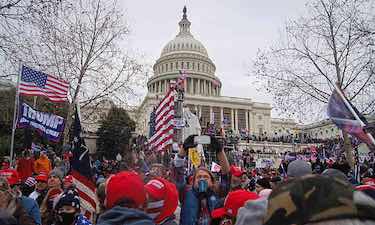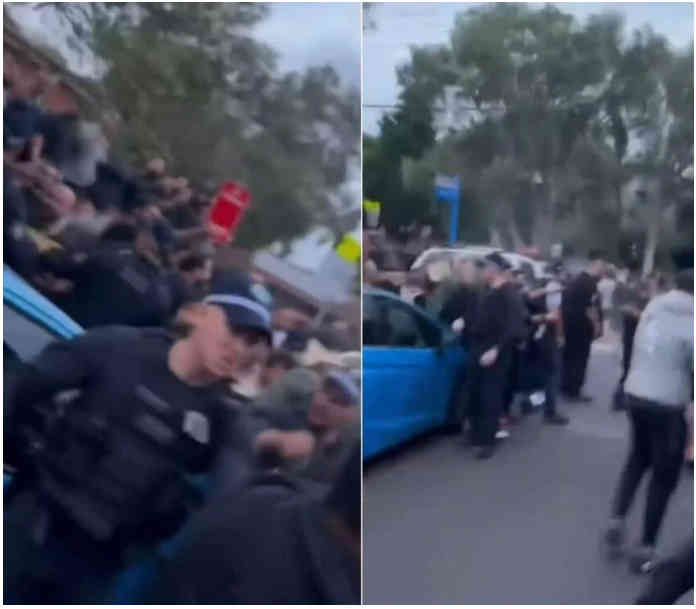A bunch of people were attending a meeting in a church in Sydney, not a church service, but a meeting to discuss gender politics and impacts on children. There were some protesters there too.
Then things turned ugly and a mob attacked with glass bottles and rocks. People screamed and swore, a woman was punched. Police were called to the “violent confrontation” (police words) and whisked the victims to safety. Several of the violent mob were arrested on the night, or later.
Some christians say they are starting to feel persecuted.
Except….
In this case, the violent mob were the (supposed) christians, several hundred of them. And the victims were a small group (15) of LGBTQI protesters that the police said were “peaceful”.
The basic facts
- The meeting was organised by the local Catholic church so their parishioners could hear speakers discuss Catholic schools, religious freedom, gender issues and parental rights.
- One of the speakers was Mark Latham, an outspoken politician from a conservative political party who has expressed strong opinions against LGBTQI activism. There were other less divisive speakers.
- Hundreds of people attended the event peacefully.
- A small group (about 15) of protesters from an LGBTQI support group, Community Action for Rainbow Rights (CARR), gathered to protest against the views of Mark Latham. Their protest was apparently peaceful, although it has been claimed they “desecrated a crucifix”.
- A couple of hundred people gathered outside, apparently to counter the CARR protest, and it was this group that turned violent. It seems that some text messages called for aggressive confrontation to remove the protesters. Some of the language used was violent and crude.
- The church later condemned their actions and said they had no association with the church. There was some claim that they blocked entry to the church, but this seems unlikely with only 15 protesters.
- Police were called and led the protester group away for their own protection. At least 3 of the violent mob were arrested and one has since apologised.
Lots of questions
It is easy to take sides on the actions of the various groups involved. The church had every right to hold the meeting, whether we agree with their views or not. The LGBTQI protesters had every right to protest, provided they didn’t disrupt other people too much. The counter protesters likewise had the right to express a view, provided they too didn’t disrupt others or act violently (which unfortunately they did).
But all that is pretty obvious. My interest is in what this incident, and many other less violent disagreements, say about how christian belief and practice is evolving in first world communities. I have many questions.
Is christian identification becoming a political weapon?
For some people, does christian identification have little or nothing to do with Jesus and his teachings, and is all about a political, national or idealogical tribe?

This seemed particularly to be the case with the MAGA riot at the US Capitol 2 years ago, where “Trump” signs, US flags and Jesus rhetoric were very mixed.
Does it happen in less violent ways too? Have right wing political idealogues worked out ways to press conservative christians’ buttons and get them onside on many issues that are not christian?
Should christians be so concerned about LGBTQI rights?
Is there really an agenda around gay and trans rights to corrupt youth? Can a person’s sexuality and gender choices be so easily compromised? And if sometimes they can, are there better ways to protect vulnerable children? What exactly do we think they are vulnerable to?
There seems to be little recognition by conservative christians that LGBTQI people have suffered, been discriminated against, subject to violence and even murdered in days gone by. And even in the present. Could protests against them continue the hurt? Could christians find more loving ways to express their personal views?
And is gender at the core of christian ethics? Are not pride or materialism or violence at least as important? Does a moralistic focus on sexuality and gender divert attention away from these other issues? Are christians focusing on the targets that God is most concerned about?
And why the emphasis on trans people? What Biblical or ethical command are they contravening?
Is choice God’s way?
Should christians in democratic countries oppose other people’s choices if they disagree with them? What are christians afraid of?
Does God really want us to take away people’s freedom of choice if we can? When is that right in a democratic society?
A democracy is built on freedom of choice provided it doesn’t harm others. Have conservative christians demonstrated how gender and sexuality issues cause harm in society?
What place does force and threat have in christian public ethics?
Most of us accept that police and the law are necessary components in a peaceful society. So is there a place for violent behaviour by christians? Do the ends justify violent or threatening means?
Jesus said to love our enemies and pray for them, not threaten them. Should christians withdraw their support for movements that use threatening rhetoric or support violent behaviour?
Can evil methods be used to achieve supposedly good outcomes?
It seems that truth is often missing in more extreme politics these days. It probably always has been, but modern methods of persuasion via social and electronic media seem to have become more sophisticated. Have we christians learnt to recognise when we are being manipulated, and do we care enough about truth to be willing to change our minds when necessary?
Does allegiance to our tribe matter more than truth?
So we see the claim of a stolen presidential election in the US being made and repeated and use to justify extreme actions without any credible evidence being offered. (We have even seen a billion dollar court case accept that lies were told by Fox.) We see voter suppression, gerrymandering and obviously false propaganda such as Tucker Carlson’s edited film of the Capitol riot all being naively accepted by christians.
Do christians need to be “as shrewd as snakes and as innocent as doves” (Matthew 10:16) in this matter? Can we support such dishonest behaviour and still follow Jesus who is “the truth”?
Should we be suspicious of a fear-based response?
The Bible says hundreds of times to “fear not”. God’s spirit doesn’t make us fearful (2 Timothy 1:7). Surely we should learn to be suspicious of those who urge us to act out of fear – whether fear of a “rainbow agenda”, socialism or the loss of religious feedom?
What things should we truly fear, or be wary of, and what things are manipulated fears to hold our allegiance?
Is christianity inherently political?
Some christians believe that we should focus on “the gospel” and avoid politics. Is this right? Are these sometimes the same people concerned about the rainbow agenda?
Historians say the early christian proclamation that “Jesus is Lord” was inherently political, setting Jesus up against Caesar. So if christianity has political implications, which politics will we support? Which politics is closest to the teachings of Jesus?
Perfect love casts out fear (1 John 4:18). So should we look for a politics of love, acceptance and service rather than fear, individual rights and force?
The Capitol rioters set up a mock gallows and chanted “Hang Mike Pence!” But shouldn’t christian politics be based on the cross of service rather than the gallows of force?
The extremes affect the moderate
Extreme views and behaviour impact on us all. They can make us inured to violence and hateful rhetoric. They can make forceful behaviour feel “normal”.
And they can make us feel fearful, concerned that our religious freedoms and rights are under threat. And then lead us to respond in ways that lack faith.
But they can also polarise, turn people away. In particular, young adults, young voters, who have come thorugh the school system have been taught to be more accepting and less judgmental about people who are different, whether by gender, sexual orientation, race, disability or anything else. Is that tolerance why gender teaching in schools is one of the conservative targets?
Not all live out those values, but many do. If christians can’t find a way to be equally tolerant, or to be more loving, we will cut ourselves off from half a generation.
There are two contrasting movements in christianity today
We christians have a choice.
To support violent and fearful rhetoric, divisive and intolerant attitudes, and allow them to be the way Jesus is represented in our society.
Or to react against fear and force and turn away from organisations that support it, and follow the serving, peaceful, loving way of Jesus.
We will still face difficult decisions. We’ll still have to address complex issues.
But if our heart attitude is right and we pray for the Spirit’s guidance, we’ll be doing things God’s way, not the failed human way.
“The weapons we fight with are not the weapons of the world.“ (2 Corinthians 10:4)
Background
- Two Arrested After LGBT Activists Attacked By Christian Mob Outside Australian Church. My Christian Daily, March 2023.
- ‘Very apologetic’: Man behind Sydney church brawl breaks silence. News.com.au, March 2023.
- ‘Soldiers of God’: The religious rights movement born in a Strathfield office. Sydney Morning Herald, March 2023.
- Christian Lives Matter Supporter Crashes LGBTQ Protest To Give A Nazi Salute. Star Observer, March 2023.
- Updated: Catholic Archdiocese of Sydney condemns violent protests at St Michael’s, Belfield. Catholic Weekly, March 2023.
- A horn-wearing ‘shaman.’ A cowboy evangelist. For some, the Capitol attack was a kind of Christian revolt. Washington Post, July 2021.
- The uncomfortable truth about Christian involvement in the Capitol riots. Premier Christianity, June 2022.
- The Capitol Attack Signaled a Post-Christian Church, Not Merely a Post-Christian Culture. Christianity Today, January 2022.
- They invaded the Capitol saying ‘Jesus is my savior. Trump is my president’. Sojourners, January 2021.
Main photo: Violence outside a Catholic church in Sydney forces police to intervene and make arrests. The photo is from The Catholic Weekly; it is a composite of two stills taken from video footage on Twitter. I believe using this here is fair use for the reporting of news, and therefore acceptable.
Storming of the United States Capitol, Tyler Merbler, in Wikipedia.





Lots of things to think about there.
I’ll just say at the moment that there is no excuse for violence except in self defense, but the LGB+ group tend to be noisy and disruptive and show little respect for other people’s rights to gather peacefully and express their views.
Not that that is an excuse but I can see how annoying it would be to be continually disrupted from having peaceful discussions regardless of whether others agree or not.
Yes, protests can be annoying, but (1) the police said this group was “peaceful” and (2) both left and right protest and have the legal right to do so. Whether the protesters were provocative I don’t know.
In this case, the violent mob were the (supposed) christians, several hundred of them. And the victims were a small group (15) of LGBTQI protesters that the police said were “peaceful”.
If this it seems that the attackers were One Nation supporters rather than “Christians” as such, although maybe Christians took part, who knows .
As we know One Nation people are not the most tolerant individuals and I certainly would not equate them to Christians concerned about family family values or other things important to them.
It would also be nice if the Rainbow Rights group enunciated what “rights” they actually want rather than interfering with other people’s rights to criticise them.
I agree with you here. I think the primary identification of the “mob” was anti LGBTQI rights, maybe One Nation, while their christian identification was secondary. My concern as a christian is that the two become confused, and the christian identity is what is publicly stated even when it isn’t primary. I think in the history of christianity (think Reformation, Northern Ireland, MAGA) it has been too easy to parade a christian identity while not showing any signs of perosonal allegiance to Jesus and his teaching.
I don’t know anyting about CARR, but I think the LGBTQI community has expressed their wishes quite well – an end to discrimination and hate that leads to adverse outcomes for LGBTQI people. But whether demonstrating against Mark latham is an effective tactic, I have no idea. And I do think that sometimes they wish to too much curtail the rights of others to disagree with them. It is a delicate thing. I have several LGBTQI friends of various situations, and they feel very sensitive to how they have been treated. I may not agree with everything they feel concerned about, but I think their general feeling of being traumatised is justified, so in general I support them.
The treatment of LGBTIQ people by society over the years in many cases has certainly been abysmal.
These days, various Acts of Parliament give them protection from discrimination in employment and supply of services and marriage and that’s a good thing.
Whether any criticism of them is ‘discrimination’ I’m not so sure.
If parents don’t like kindergarten or primary school children being read to by drag queens, that a grave affront to some in the LGB community but I think parents have a right to object to these things. Drag queens obviously exist, but they exist in an adult world and indoctrination of children in such matters is not a function of schools in my opinion.
Parental rights was one thing to be discussed at the meeting concerned and it’s an issue of concern to many.
Yes, there must be some balance here.
I agree parents must have a right to object to what their kids are being taught, but exactly where the line should be I don’t know. Should parents be able to prevent the following ….?
• Kids being read stories by drag queens?
• Kids being taught facts about gender, including Homosexuality?
• Kids being taught tolerance and non-discrimination towards LGBTQI people.
• Alternative gender relationships being depicted in books, exam questions, teaching, etc?
• Kids being taught that all gender and sexual preferences are “OK”?
• Kids being taught more inclusive language?
etc
And if it is OK for some or all of them, at what age?
I feel the LGBTQI community may ask for too much, while the conservatives may confuse facts and tolerance with ethical agreement, and so oppose too much..
I’m probably old fashioned hut I think that a school’s function is primarily academic education and the social education should come from the parents and the children’s own life experience.
Our education system is failing and that is why we depend so much on skilled migration.
I think I disagree and agree with you here. I think an education should benefit the child and society. So I think it should achieve several things – give people skills they can develop to get work and contribute to society, socialise them so that kids are not totally dependent on their family upbringing and prepare them for life. I think many academic skills and knowledge given in all levels of education are of very limited value.
So I agree that our education system is not good, but for different reasons.